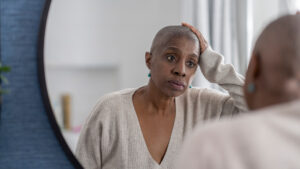Jada Pinkett Smith and her battle with alopecia came into the spotlight thanks to last night’s Oscars.
Now, there is certainly no need for commentary about “the smack heard ’round the world.” Whether you think Chris Rock deserved it or not, or whether you think Will Smith overreacted or not, the one fact that remains the same is Jada’s diagnosis.
Alopecia happens to be a very common autoimmune disorder, but that doesn’t mean that Jada Pinkett Smith didn’t feel a type of way about a joke being made at her expense. (And, certainly, this writer is of the belief that Black women need to be protected at all costs, and that includes standing up for one when the situation merits such a response.)
What’s more, she’s addressed it many times over the years, so this was far from new information for anyone — including Chris Rock.
“It was one of those times in my life where I was literally shaking with fear,” she said, per Us Weekly. “That’s why I cut my hair — and why I continue to cut it. I just had [thought], ‘OK, I think we’re gonna do another layer of cutting,’ you know? And my hair has been a big part of me. Taking care of my hair has been a beautiful ritual, you know? And having the choice to have hair or not, and then one day to be like, ‘Oh, my God, I might not have the choice.’”
Let’s take a look at some other facts about alopecia.
What is alopecia?

There are different types of alopecia. Per WebMD, the most common types of alopecia include:
- alopecia areata totalis (you lose all the hair on your head)
- alopecia areata universalis (you lose all the hair on your body)
- diffuse alopecia areata (your hair gets thinner, but you don’t necessarily lose it all)
- ophiasis alopecia areata (you lose your hair on your head in a “ring” pattern of sorts)
Whichever version of alopecia you suffer from, it’s considered an autoimmune disorder and its sole symptom is a loss of hair.
Jada Pinkett Smith may be the most famous person to suffer from the disease. But other famous Black women who suffer from alopecia include Rep. Ayanna Pressley.
Jada Pinkett Smith and her alopecia diagnosis

In December 2021, 21Ninety reported that Jada Pinkett Smith went public with her alopecia diagnosis, and taught people how to handle it all with grace.
“Jada has always been graceful and accepting in her struggle with alopecia,” we reported, at the time. “She made the decision to completely part ways with her hair last July, embracing the fact that “it was time to let go.” Moving forward she claimed that her 50s were about to be “divinely lit with this shed” and has since been showing just that. She has rocked her bald scalp with confidence, appearing on numerous episodes of her talk show, Red Table Talk, and most recently at the movie premiere of The Matrix Resurrections.”
Black women and alopecia: Some alarming statistics

According to a report from NBC News, nearly 50 percent of all Black women in the United States suffer from some form of alopecia. Traction alopecia is the most common form of alopecia that Black women suffer from, and according to DermNet, this is a type of alopecia that results from “prolonged or repetitive tension on the scalp hair. It was first described in 1907 in subjects from Greenland who had developed hair loss along the hairline due to prolonged wearing of tight ponytails.”
This type of alopecia, in the beginning, isn’t permanent. But prolonged damage to the hair follicles can, in fact, result in traction alopecia becoming permanent.
Is it a disability?

According to the National Alopecia Areata Foundation, it is not considered a disability. Many women who suffer from alopecia, in fact, are in excellent health. However, the foundation notes that women — including Jada Pinkett Smith — often suffer ancillary side effects, mostly affecting their mental health, as a result of the condition.
Can it be cured?

The American Academy of Dermatology reports that alopecia cannot, in fact, be cured. However, its symptoms can be mitigated.
“For some people, regrowth will happen without any help,” reports the outlet. “Because alopecia areata cannot be cured, people who have regrowth can have more hair loss later. Some people have cycles of hair loss and regrowth. If your hair doesn’t regrow on its own, medical treatments may help. There are many treatments for alopecia areata, and scientists are studying new possibilities.”
